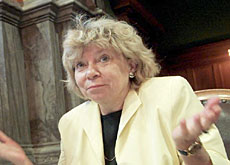
Magic Formula comes under attack

The centre-left Social Democratic Party has caused a stir in Switzerland by challenging the composition of the government.
The party’s president, Christiane Brunner, says she is in favour of allocating a second cabinet seat to the rightwing Swiss People’s Party.
Such a move would alter the so-called “Magic Formula” – a power-sharing agreement between the country’s four major political parties.
The Social Democrats, who are the only left-of-centre party in government, now claim it would make no difference to them if there were two Peoples’ Party members rather than two centre-right Christian Democrats.
Analysts have dismissed the move as political posturing in an election year.
“I don’t really think the Social Democrats would like another member of the People’s Party in government,” political scientist Andreas Ladner told swissinfo.
“It has much more to do with the ongoing electoral campaign and trying to put pressure on the Christian Democrats to make them support the party’s policies more.”
Traditional allies
The Magic Formula has shared out the seven cabinet posts in the same way since 1959.
The Social Democrats, and the centre-right Radicals and Christian Democrats each have two seats, while the People’s Party has just one.
The rise in popularity of the People’s Party at the ballot box in recent elections has seen them push for a second seat at the expense of the Christian Democrats whose support has dropped dramatically since the 1990s.
They have traditionally been the party closest to the Social Democrats, especially on welfare and social issues.
But Ladner says this has changed since the election of Joseph Deiss and Ruth Metzler to the cabinet.
“The Christian Democrats have moved slightly to the Right again because they are frightened of losing voters in their strongholds,” said Ladner.
“If the Social Democrats could ‘force’ the Christian Democrats to work more closely with them in government, then they would be in the majority.”
Double play
According to political scientist Emanuel von Erlach, it is the sense of often being at odds with the rest of the government that has partly spurred the Social Democrats to suggest doing “the unthinkable”.
He agrees that the latest developments are an attempt to put pressure on the Christian Democrats during an election year.
But he doubts whether the Social Democrats really want to see a second People’s Party representative in government.
“If there were a second People’s Party member of the cabinet it would also mean a general shift to the Right in many more policy areas,” he told swissinfo.
“That would also put the Social Democrats in a real minority position – quite different from today where they can still sometimes find common ground on social issues with the Christian Democrats.”
That minority position, he says, could also bring some benefits to the party, allowing them to be in government and in opposition at the same time.
“It would be a kind of double play and allow the party a higher profile on many areas, allowing it to be in government and at the same time attack policy decisions with which it disagrees ” he said.
“Ironically that’s one of the ways in which the People’s Party has been able to attract voters, and it could also work for the Social Democrats,” he added.
swissinfo, Jonathan Summerton
Since 1959 the Magic Formula has divided seats between the four major parties and has also taken into account linguistic and geographical representation.
The Social Democrats, the Radicals and the Christian Democrats each have two seats in the seven-strong cabinet – the People’s Party has one.
At the last national election in 1999, the People’s Party received the largest number of votes, just ahead of the Social Democrats.
The members of the government are chosen by parliament – rather than the people – and are re-elected every four years.

In compliance with the JTI standards
More: SWI swissinfo.ch certified by the Journalism Trust Initiative

















![The four-metre-long painting "Sonntag der Bergbauern" [Sunday of the Mountain Farmers, 1923-24/26] had to be removed by a crane from the German Chancellery in Berlin for the exhibition in Bern.](https://www.swissinfo.ch/content/wp-content/uploads/sites/13/2025/12/01_Pressebild_KirchnerxKirchner.jpg?ver=8f77363a)











You can find an overview of ongoing debates with our journalists here . Please join us!
If you want to start a conversation about a topic raised in this article or want to report factual errors, email us at english@swissinfo.ch.